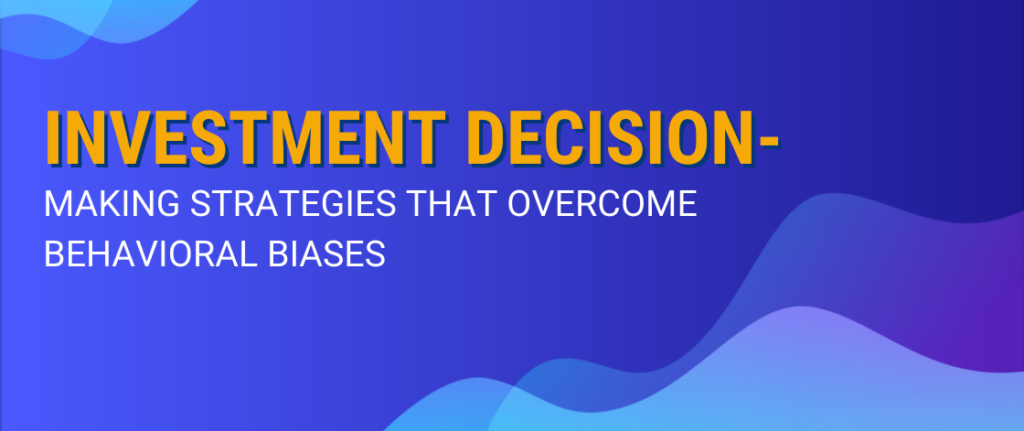
The study of how human emotions and behavior impact financial decisions and market results is referred to as stock market psychology. It is founded on the concept that market movements are influenced by economic fundamentals or firm performance and market participants’ collective attitudes and emotions.
Understanding stock market psychology can help investors make better-informed decisions by detecting and avoiding irrational behavior that can result in big losses. It can also assist investors in finding missed or discounted possibilities owing to market sentiment.
The psychology of the stock market and investor behavior are intriguing topics, such as how individuals and groups make market judgments. Understanding market psychology can help investors make better-educated decisions by providing insights into the elements that affect stock prices.
In this blog we will discuss how investors’ emotions might influence their investment decisions by researching stock psychology. We’ll also talk about how investors can attempt to overcome their prejudices. Finally, we will offer practical ways to overcome behavioral biases while making financial decisions.
We will begin by discussing why it is critical to comprehend the role of psychology in financial decision-making.

Role of Psychology in Making Investment Decisions
Psychology is important in investment making decisions because it influences investors’ behavior, emotions, and decision-making processes. A detailed grasp of investor psychology can give insights into the elements that influence investing decisions and assist investors in avoiding typical errors.
Emotions: They are one of the key ways psychology influences financial decisions. Fear, greed, and overconfidence can all contribute to irrational actions by investors, such as purchasing high and selling cheap. Investors may make better sensible financial decisions if they understand and manage their emotions.
Cognitive Biases: They are also important in financial decisions. Confirmation bias, for example, might cause investors to seek information supporting their previous opinions, even if it is inaccurate or irrelevant. Similarly, the halo effect can cause investors to lose money.
Heuristics, or mental shortcuts, can influence investment decisions as well. The availability heuristic, for example, might induce investors to base their judgments on information that is easily accessible rather than taking into account all relevant information.
Social Psychology: They can have an impact on investing decisions. Investors may be affected by the conduct of others, which can result in herd behavior or groupthink, which can lead to poor investing judgments.
Finally, recognizing the impact of psychology on financial decisions is critical for investors. Investors may make better informed and reasonable financial decisions by identifying and controlling emotions, avoiding cognitive biases and heuristics, and understanding social effects.
The next section examines how emotions and biases affect investment decisions.

Examine how Emotions and Biases Affect Investment Decisions
Emotions and prejudices may greatly influence financial decisions, frequently resulting in unsatisfactory results. These are a few examples of how emotions and biases may influence financial decisions.
- Fear and Greed: Fear and greed are two of the most powerful emotions that may influence financial decisions. During market downturns, fear may lead to panic selling, while greed can seek high-risk, high-return assets without proper investigation and analysis. These emotions might lead to rash judgments at odds with an individual’s investing goals and objectives.
- Confirmation Bias: Confirmation bias is the propensity to seek out information that supports one’s pre-existing opinions while rejecting information that contradicts them. This can lead to overconfidence in financial judgments and a refusal to explore alternative viewpoints.
- Anchoring Bias: It arises when an investor bases their choice on a single reference point, such as the initial price at which they acquired a stock, rather than considering current market circumstances and other pertinent aspects.
- Loss Aversion: Loss aversion is the inclination to associate pain with losses rather than pleasure with gains. This can lead to investors hanging on to failing assets for too long in the hope that they will rebound rather than cut their losses and move on.
Emotions and biases can have a wide range of effects on investing decisions. Investors should build a disciplined investing plan based on their investment goals and objectives to reduce the influence of emotions and biases. It is critical to investigate how biases influence investing decisions.
In the next section, we will talk about how investors overcome these biases.
If you need some ideas about what to read next, here they are:
- Analyzing the Changing Landscape of Stock Market Regulation
- Managing Conflicts in Family Business: Strategies for Resolving Differences and Maintaining Harmony
- The Role of Family Members as Investors in Family Business: Strategies for Maximizing Returns and Minimizing Risks
- The Changing Landscape of Consumer Debt and the Relationship Between Consumer Debt and Recession Risk

How Investors Overcome these Biases
Investors must overcome prejudices to make better investing selections. These are some ways that investors may employ to overcome prejudices.
- Education: It is a critical first step in overcoming prejudices. Investors should educate themselves on the numerous forms of biases that might influence their decisions and devise techniques to limit their impacts.
- Awareness: It is critical for understanding when biases are impacting financial decisions. Investors can fight prejudices by being aware of them.
- Diversification: It is a method that can assist investors in reducing the influence of biases on their portfolios. Investors can reduce the risk of any single investment choice having a large influence on their whole portfolio by spreading their assets across several asset classes and businesses.
- Develop a Systematic Approach to Investing: Investors can develop a systematic approach that eliminates the need for emotional decision-making. Investors can prevent the influence of biases on their decision-making by following predetermined guidelines for purchasing and selling stocks.
In the next section, let’s dive deep into the decision-making strategies that overcome behavioral biases.

Investment Decision-Making Strategies that Overcome Behavioral Biases
Investing decision-making is a complicated process, including several aspects such as market circumstances, financial research, and investor psychology. Behavioral biases can influence investor decisions, resulting in inefficient investment decisions. Yet, investors may employ a variety of tactics to counteract these biases.
- Invest systematically: Investing in a systematic manner can help lessen the influence of behavioral biases. Using dollar-cost averaging, for example, to invest a predetermined amount of money at regular periods can assist investors in avoiding the temptation to time the market.
- Diversify your portfolio: Diversifying your portfolio can assist in decreasing risk and lessen the influence of any single investment on your portfolio. Investors can prevent overexposure to any one stock or industry by diversifying their assets across asset classes and sectors.
- Do extensive research: Performing extensive research prior to making an investing selection will help investors make better-educated decisions. Investors can make judgments based on facts rather than emotions or intuition by obtaining and evaluating relevant data.
- Get expert advice: Consulting with a financial advisor can assist investors in overcoming behavioral biases. Advisers may help investors keep focused on their long-term goals by providing a more objective view of investing decisions.
By adopting the above-mentioned steps, investors can reduce the impact of behavioral biases and make more informed investment decisions.
Bottom Line
Finally, recognizing the role of psychology in financial decision-making is critical for investors who want to make informed and sensible judgments. Emotions, cognitive biases, heuristics, and social psychology may all influence investing decisions. Some of the biases that might influence financial decisions are fear and greed, confirmation bias, anchoring bias, loss aversion, and overconfidence bias. To counteract these biases, investors should develop a disciplined investing plan based on their investment goals and objectives, undertake extensive research, and obtain various perspectives. They should also work on self-awareness, emotional management, and avoiding herd mentality or groupthink. By following these tactics, investors can make educated judgments while avoiding illogical actions that might result in big losses.
Join Our Newsletter
Elevate your financial game & join the ranks of elite investors with Secvolt’s exclusive newsletter.
Join Our Newsletter
Elevate your financial game & join the ranks of elite investors with Secvolt’s exclusive newsletter.
Don’t just dream of wealth; achieve it with Secvolt. Schedule a call today for personalized guidance on your investment strategy and join the ultra-successful.
Ready to unlock your wealth’s truest potential & cherish affluence?
Secvolt, our hedge fund, sets the bar high with a record-breaking performance of 262% returns in 2022. With the brilliance of our highly advanced quant models and the efficiency of our risk mitigation protocols, we are yet to see a loss!
We’re the perfect ally to help you succeed financially and build the lasting legacy you have always aspired for.
Get in touch today. YOUR LEGACY AWAITS YOU…





